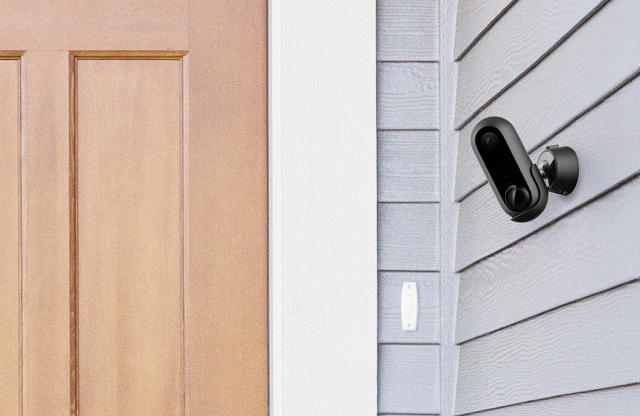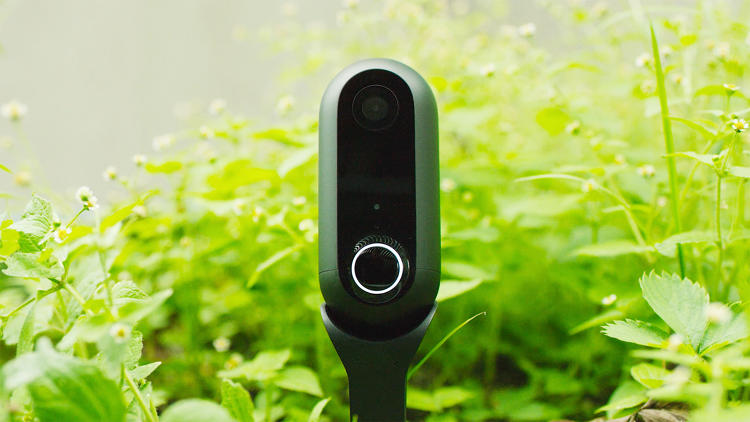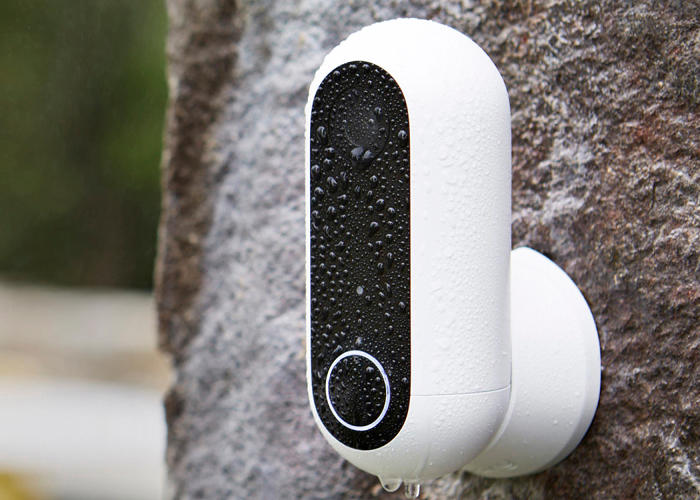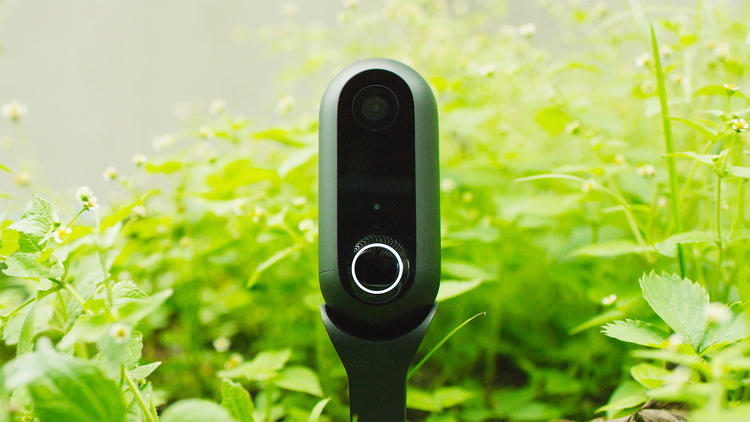Eying Nest, Canary Launches An Outdoor Security Camera Aimed At Businesses
When Canary’s cylindrical home security tower launched as an Indiegogo project in 2013, it received a rosy reception. Now the company is launching a new slickly designed wireless outdoor security camera called the Canary Flex.
The announcement comes months after Nest debuted its own $199 outside camera. While Canary’s new product may look like a tagalong, founder Adam Sager says his company had been working on the Flex for years before he knew about the latest addition to the Nest family. Canary has been called a formidable competitor to Nest, but up until today there hasn’t been much differentiating the two products in the eyes of many reviewers. To pull itself out of Nest’s shadow, the company is focusing intently on security, rather than on being a more general-purpose internet-connected webcam.
Both Nest and Canary currently offer a similar amount of free access to video viewing. Their subscription services, which let customers rewind through stored video for a fee, are likewise also comparable. But Canary’s new product and services scheme could give it the extra oomph it needs to stand up against the Nest Cam.

Canary’s new $199 outdoor camera is a pill-shaped weather-proof device that attaches to a wall mount magnetically, though a more secure mount is available as well. Like the original Canary it features night vision. To operate, it must connect to Wi-Fi, which may limit how far outside a house it can be mounted, but it is cordless, unlike Nest’s new outdoor camera. That means you don’t need to run a power line outdoors in order to use it (though you do have the option to plug it in if you so choose). The battery lasts two months between charges and it takes about 2-3 hours to recharges.
Of course, as Sager says, Wi-Fi connectivity “is not perfect everywhere.” To deal with dead zones, Canary lets customers know which areas of their house (or outdoor space) is best connected. The company has also devised a wireless mount that connects to 4G LTE through Verizon (of course this will come with a monthly fee paid directly to Verizon).
The wireless nature of the device has spurred Canary to build a variety of different kinds of fixtures like stake mounts so the camera can sit in an unassuming place like a garden. Though a garden camera seems crafty, robbers could get wise to the trend and start stealing them. And it’s easier to avoid a camera’s eye when there’s room to come up behind it, as there would be in a garden. Of course, if a thief were caught on camera stealing the camera or perpetrating any other kind of activity, the victim would be notified instantly via Canary’s service.
While the device itself is snazzy, the more eyebrow-raising offering from Canary is its new video pricing system. Starting in October, the company is rolling out a new membership system that will let customers access their last 30 days of video clips for $9.99 a month, or $99 a year. If you own two to three cameras, that subscription fee will be $14.99 per month, or $149 a year. Canary will also up its free offering, giving consumers without a plan access to the last 24 hours of video—an increase from 12.
Canary is also expanding its customer service program. The company has built out a team of agents to help people manage the aftermath of an incident, like a robbery. Not only will they retrieve the appropriate video, they’ll also walk you through evaluating damages, and other processes for reporting lost or damaged property. The new Canary subscription package and device is designed with small businesses such as stores and restaurants in mind as well as consumers. Last year, Canary did a pilot with a range of small business including restaurants, offices, and stores to understand their product needs.
“Most of the security companies won’t even sell to a small business,” says Sager. He’s referring to corporate security systems that often require longer-term contracts, like ADT.

By comparison, Nest’s free plan enables only live streaming and the ability to view the last three hours of video captured. For $100 a year, you can access a 10-day video history at any time (additional cameras are another $5). If you pay the subscription fee, Nest will also notify you when it detects motion or sound or a human. For $300 a year, you can get a 30-day history, with extra cameras costing another $15 each. Much of the software between Nest and Canary has been historically comparable. So Sager is pushing for more services to assist customers after their home has been compromised—a place Nest may not be as keen to compete in.
“I think a lot of people in the industry have been distracted by home automation,” says Sager. “We’re not trying to turn your home appliances into robots.” Certainly Nest with its Nest Cam, Nest thermostat, and Nest Protect has an interest in the future of the connected home. The company has been feverishly building out a network of products that Work With Nest. While Canary does connect to home hubs like the Amazon Echo and the Wink Home hub, Sager is more intent on expanding into the kind of over-the-phone assistance that big security companies like ADT provide.
Canary’s approach might very well pay off. This has been a strange year for Nest. The company launched its outdoor product, but overall Nest Cam sales are said to be slowing. We don’t know exactly how much the camera (originally known as Dropcam) is earning, but we know that it’s contributing to Alphabet’s non-Google business, which in 2015 earned the company $448 million, according to its fourth-quarter earnings. Analysts had expected that Nest alone would earn $627 million in revenue, according to Forbes. Then there was the infighting between Nest CEO Tony Fadell and Dropcam founder Greg Duffy, which resulted from a report on the unhappy work culture at Nest. Months later Fadell left Nest to explore other opportunities.
Canary has only been on the market for 16 months and the company is mum about sales. What we do know is that the company pre-sold 15,000 cameras, which at $199 a pop probably landed the company $3 million, including its Indiegogo campaign which pulled in nearly $2 million in funding through pre-orders. Canary is currently being sold in 10,000 retail locations as well as on Amazon and customers in 115 countries have hooked up a Canary. The company is also processing about 600 million videos per day.
The overall home security market is expected to be worth $47.5 billion by 2020, according to MarketsandMarkets. Meanwhile the install-it-yourself home security market like Nest Cam, Canary, or SimpliSafe is thought to be about $1.5 billion, according to NextMarket. To effectively compete here, Canary will need to address some of the problems it’s seen early on: alerts. Users can be overwhelmed by notifications. Even though the company has made adjustments to notification settings, allowing customers to limit them, they’re still a bit overwhelming. Nest Cam suffers from this too, and it’s an issue that could prevent these sorts of simple home security companies from truly playing against more robust home security systems that tend not to bother homeowners and renters in their day-to-day life.
This gets down to the bigger question: Is Canary enough? With this new product, the company will need to prove that its cameras aren’t just capable of competing with Nest Cam, but that they’re sturdy enough to hold up against home security titans.






Fast Company , Read Full Story
(109)














